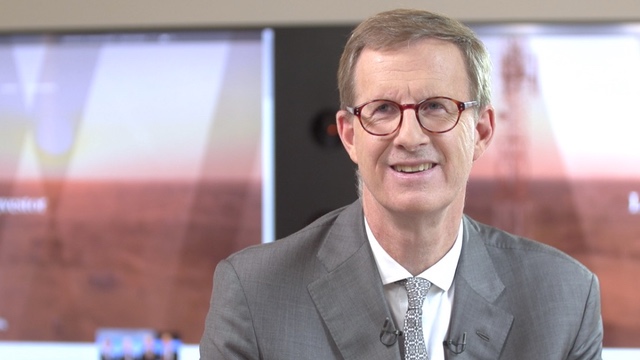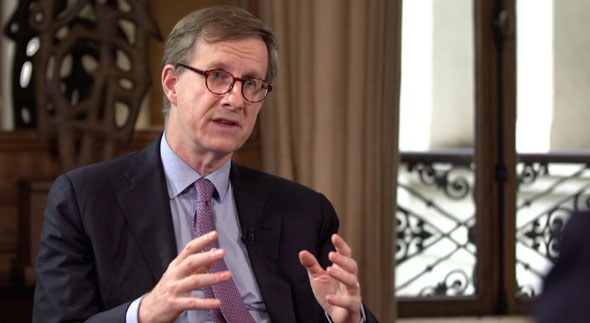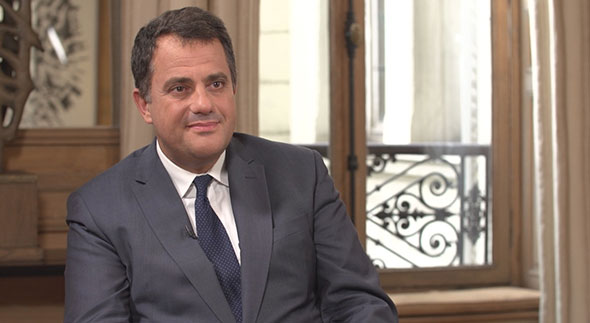EuroBusiness Media (EBM): Wendel, one of Europe’s leading listed investment firms reports results for 2014. Frédéric Lemoine, welcome. You are the Chairman of the Executive Board of Wendel. To begin, what are your comments on the 2014 results you have just announced?
Frédéric Lemoine: We’re quite satisfied with 2014, in spite of a somehow sluggish environment in some areas, like Europe. We ended up with a lot of successes. Most of our companies, nearly all, have experienced positive organic growth. They have seized some tremendous opportunities to develop by external growth. Stahl, Clariant, IHS or Materis which successfully refocused its activities on the paints business. So the main achievement in terms of financial management, we’ve been upgraded investment grade, we have succeeded in issuing some bonds for very long maturities – twelve years, low cost – 2.5%. So all in all there’s been quite a success, notably because we accelerated very significantly our investment activity. In 2013 we invested €300 million, in 2104 we invested in four times as much – €1.2 billion, totalling €1.5 billion of investment, 75% of the objective we had set for a four-year period. So we are ahead of our plan and we did it in very good companies, in the three continents that we targeted, in non-listed assets as we planned. So, for the time being, we are more than on track.
EBM: You mentioned that 2014 was a year with an important news flow. Could you give us some colour on your portfolio of companies?
Frédéric Lemoine: Of course, we invested $500 additional million in IHS, we invested in the US in CSP Technologies, €160 million, nearly 200 million dollars at a time and last but not least, we made our largest investment in a non-listed asset since 2007 with Constantia Flexibles, a world leader in flexible packaging in Austria. On the other side, we optimised the size of our two largest listed assets, Bureau Veritas and Saint-Gobain, by reducing our stakes by €1 billion each, more or less, to keep the same level of control and influence, but with less financial means.
EBM: Could you give us a bit more details on the lowering of your participation in Bureau Veritas, the company you’ve been invested in for a very long time now?
Frédéric Lemoine: More than 21 years. And it has been a very clear decision. We keep the control of Bureau Veritas. We have more than 40% of the ownership of Bureau Veritas, 56% of the voting rights and before we had 52% of the ownership and 66% of the voting rights. It was a little bit too much and it was useless to keep the control of the company, whereas in this case we have increased the free float and we have freed €1 billion, €975 million exactly, to redeploy on unlisted assets. So we are absolutely passionate about Bureau Veritas, we believe there are great years to come for the company and we intend to participate in the future of Bureau Veritas very actively.
EBM: You mentioned the acquisition of Constantia Flexibles, could you also give us more details about this acquisition? Is it a large acquisition?
Frédéric Lemoine: Yes, Constantia is a large company, the number 2 in Europe for flexible packaging, number 4 in the world. 8,000 employees, 43 different plants in different countries and really a large leader, €1.7 billion of revenue, €256 million of EBITDA. A large manufacturing company, the kind of company we like, created in the 1960s, we are partnering with the founding family that invested 27% with us through the foundation, the Turnauer foundation that they created and now we have 73% of the company, having invested €640 million. So it’s a really large investment in which we are going to stay for long, developing the company organically and externally. It’s fascinating because it’s really the type of packaging that is supported by a lot of long-term trend and is growing quickly; flexible packaging. Metallic packaging we know it well, we’ve been CarnaudMetalbox, it’s not growing that much. We like glass packaging also, we have been associated with glass packaging for Saint-Gobain, they are selling now Verallia, the Glass packaging leader that is an excellent company, but not growing that fast. Very recurrent business, resilient company, providing a lot of cash. A nice company to have, but not growing that fast. We have chosen to invest in a segment that grows typically 4 - 5% organically per year because the growth is fed by organisation, smaller households, premiumisation of packaging; think of coffee or chocolate as a portion gets smaller and there is more aluminium, plastic or a mix of the two around the food or the contents. Also the same for pharma, and that’s what we are involved with.
EBM: You mentioned in passing a renewed investment in IHS. That’s a great success for you in Africa?
Frédéric Lemoine: IHS has been the company of the year in 2014 for us, but also for the market. They have just been elected the African company of the year, throughout all sectors. So this has been a company growing by acquisition, acquisition of towers, they build and manage for the customers telecom towers that are shared by their telecom operators to put their equipment on it. In five countries, the largest of which being Nigeria, where they bought all the towers from Etisalat and all the towers from MTN to have the largest operators in that country. MTN is still partnering with IHS in that country. The also bought new towers in Rwanda and Zambia, in Cameroon and Côte d’Ivoire. They have been excellent in terms of developing quickly in a controlled way also; the EBITDA has grown 130% during the year and clearly this space is not one-shot, it will be renewed, because the number of towers has grown and the number of tenants in each tower will grow in the future. So we are, I think, in a year where Africa has been quite on top of the list of all investors -we have not chosen the worst company.
EBM: Far from it. And finally, how are these successes going to trickle down to your shareholders? What is your policy of return to shareholders?
Frédéric Lemoine: We really do care a lot about shareholders. They are quite demanding, the family of reference shareholders or individual shareholders or institutional shareholders we have in our company. We wanted to clearly show that we didn’t want only the shareholders to take advantage of the growth of our value, which is real – our net asset value has exceeded €7 billion recently – but also that they get some return through the dividend. We have increased the dividend proposed to our next general meeting of shareholders from 1.85 euros to 2 euros per share, the level the dividend was before the financial crisis in 2007 it reached 2 euros, which was a good sign also with this increase of 8% to show that a page has been turned since the time Wendel was in the financial crisis. So we were successful in investing in good companies, we were successful in strengthening our financial structure, I think it was necessary to show it to our shareholders.
EBM: Frédéric Lemoine, Chairman of the Executive Board of Wendel, thank you very much.
Frédéric Lemoine: Thanks to you.





